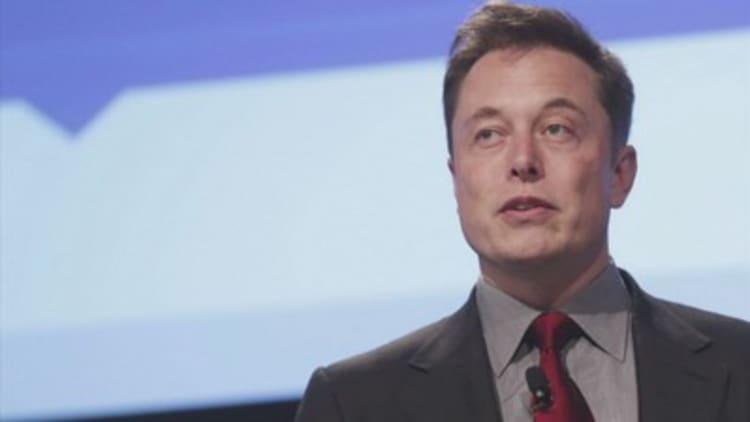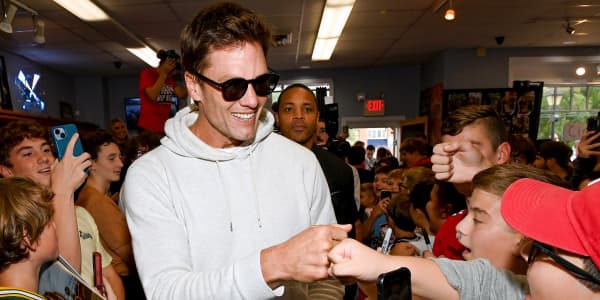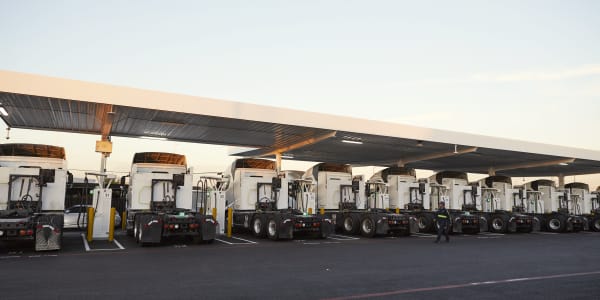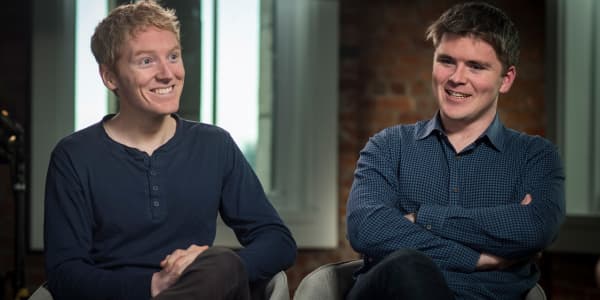When a Tesla on autopilot recently crashed into a fire truck and another stopped on the Bay Bridge between San Francisco and Oakland, it renewed fears that the Tesla self-driving technology isn't all that good. Tesla has said all along its Autopilot is intended to assist, not replace, a human being behind the wheel. (It also turns out, as the feds continue to investigate several Autopilot incidents, in at least one the driver was drunk.)
But in a recent ranking of all the self-driving software on the market by consulting firm Navigant, it found Tesla's self-driving technology to be the industry's worst. Former Uber CEO Travis Kalanick said in court testimony this week — in the closely watched Uber-Waymo trade secrets case — that Alphabet's Google Waymo unit is "in the lead" with self-driving technology, and has been for years.
Tesla will continue to receive scrutiny — it attracts as many skeptics as investors — in the race to self-driving vehicles. There's another component of its autonomous vehicles strategy that remains debatable and linked to the value of its technology: Intellectual property experts consulted by CNBC could not find one patent related to self-driving technology associated with Tesla in the period between 2011 and 2016. As advances in autonomous technology occur at an exponential pace, Tesla is the only major player in the auto sector — including both car manufacturers and suppliers — or tech sector that has no patents in recent years related to self-driving.
"Ford and GM have lots of self-driving patents. ... I think this speaks volumes. Many think self-driving is a huge opportunity for Tesla," said Dex Wheeler, chief analyst at intellectual property research and asset management firm M-CAM International. M-CAM, which creates and manages an index of innovative companies — based on analysis of IP value — for CNBC, the CNBC IQ Index 100, has never included Tesla.
The overall number of patents from the auto sector has been growing rapidly in recent years.
The obvious response is as follows: Tesla doesn't believe in patents, and anyone familiar with the company would know that. Elon Musk penned a famous letter in July 2014 explaining his views on patents and why Tesla would give them all away. But the truth is different.
Tesla continues to patent technology, just not related to autonomous vehicles. While its overall pace of patenting is below that of peer companies, recent Tesla patents involve interesting uses of battery technology. One example: a swapping mechanism that would allow semi trucks to replace batteries rather than recharge while on long-distance routes. Tesla also has patents covering energy storage, a key area for the the end-to-end solution in Musk's grand vision that bridges electric cars and solar power and energy storage.
There have also been indications from the major players in the autonomous vehicles race that they will avoid the kind of IP legal war that consumed the software industry as it saw exponential growth in the 1990s. In addition, Ford, Honda Motor, Hyundai, Volkswagen and Tesla are among the members of the LOT Network, a nonprofit consortium in which companies pledge to continue to make their patents available to all members even if they sell them to another firm. It's just that when it comes to self-driving, Tesla is the member that seems to have the least patents to share.
Tesla's IP philosophy
To the doubters, the reason for the 2014 Musk letter and the lack of self-driving patents does not stem from any generosity on the part of Musk. If anything, it's more out of Musk's master-of-PR playbook. The underlying truth, say experts: Tesla's IP isn't very good. "That was a big sign of weakness from Tesla," said Matt Rappaport, co-founder of patent research firm IP Checkups of the July 2014 "All our patents belong to you" letter. "Tesla is saying they don't have anything of value; therefore, they will just give it to the world."
"It's fair to say the IP could be weak," said Celine Crowson, a partner at Hogan Lovells who specializes in patent litigation and protection in the tech sector. She added that the open-source patent philosophy also is one that typically has been held by some of the most innovative engineers and companies coming out of the software space. Crowson said there are examples of large, incredibly successful companies that stuck to open source, but many did ultimately struggle when it came to sustaining financial performance.
Tesla did not respond to repeated requests for comment.
Yet being skeptical of Tesla and Musk hasn't been a good bet. Shorts have been clobbered by Tesla's share price. Musk also just successfully launched the most powerful rocket ever on Tuesday, and did it in a live video show that sent a Tesla Roadster into the asteroid belt and was much more thrilling than filing a patent application.
Musk said after Tesla's latest earnings were reported on Wednesday (shares were trading down as much as 2 percent on Thursday as Wall Street digested the numbers), "If we can send the roadster to the asteroid belt, we can probably solve Model 3 production, it's just a matter of time." If SpaceX was able to bring two rockets back from space and land them perfectly and in synchronicity back on land, should we really doubt Tesla's ability to teach a car to drive itself?
Musk and a key autonomous-driving Tesla official did fire off dueling tweets on Friday, Feb. 2, about the Autopilot technology.
Chris Lattner, a former leader of the Autopilot software team who left Tesla in June 2017, tweeted that the software was "unfinished and buggy" and added that he was "sad" to see "how little progress" the technology had made. Minutes later Musk tweeted that a release candidate for an updated Autopilot was "in final testing phase," but then he added that while the technology is "feature-rich," the features "aren't reliable enough yet."
There is a compelling case to be made for not patenting technology specifically because it is of significant worth — it's why the term "trade secret" exists. Patents can reveal information to competitors better kept as proprietary trade secrets.
"They continue to file and get patents granted, but they've never been a big filer of patents, and [Musk's] companies have not been traditionally," Wheeler said.
Filings of worldwide patent families assigned to Tesla — 2011-2016
| Year | Number of patent filings |
| 2011 | 39 |
| 2012 | 52 |
| 2013 | 22 |
| 2014 | 26 |
| 2015 | 38 |
| 2016 | 33 |
Source: IP Checkups
"When filing, you are making a statement to world — 'This is what we are doing' — and to a certain extent, 'This is how.' Competitors can reverse engineer self-driving from a patent filing. ... We all know Tesla is working on self-driving, and we all know anything they patent is fair game for competitors to use. Maybe they are just trying to keep it just for themselves," he said.
"My guess is that trade secrecy is involved," said Jeanne Fromer, a professor of law at New York University who specializes in IP. "Tesla made that patent pledge, which some took as a legit pledge and some saw as marketing puffery. Either way, Tesla might want to be protective of its tech and opt out of patent system because of secrecy. ... If they think they can keep the secret long enough, that can outstrip the value of patent protection."
We all know Tesla is working on self driving, and we all know anything they patent is fair game for competitors to use. Maybe they are just trying to keep it just for themselves.Dex Wheelerdirector of research at M-CAM International
Technology itself is becoming easier to protect through the advance in cloud computing. Even without a patent revealing information, in the past much of a source code could be reverse-engineered from a physical chip in a device, or in this case a car. That's because the executable file would be printed in binary zeros and ones on a chip, and then anyone could use standard techniques from that executable in binary to reverse-engineer to the source code.
Fromer said some industries historically have opted to go the trade-secret route rather than seek patents, such as the food sector. The tech sector has been more prone to use patents, but the cloud may be changing that.

"To the extent that a business model involves running software on the cloud, competitors can no longer get the same information," Fromer said. "You don't have access anymore to the source code in the same way. That's made it more plausible to keep software-related innovations secret."
Tesla is using the cloud to update its onboard systems in cars, including self-driving technology, and other key auto features. In a famous example, it was able to improve the range of some lower-priced Tesla models — lower-priced in part because they lacked the range of more expensive ones — through a cloud update during hurricane season.
One caveat to the speculation: It's possible Tesla may have filed a flurry of self-driving patents since 2016, and due to the typical 12- to 18-month period before patent applications are made public, their existence is impossible to know about.
But even skeptics think whether patents are forthcoming or the trade-secret strategy is in place already, it won't necessarily be what wins the autonomous-vehicle war for Tesla. Tesla's real strategy for selling its version of autonomous driving will reflect its existence success: branding.
"Ideally, they would have both patents and trade secrets," Rappaport said. "There are a lot of technologies tied up in autonomous driving, from A.I. to chips to lidar, software and sensors. Having a portfolio of diverse IP assets and relationships with suppliers will certainly be required for sustained success. But because the most valuable product is the users themselves and their data, branding will likely be the big differentiator. I believe if Tesla becomes the most successful autonomous driving company, it will be due to branding rather than more defensible IP."
More from CNBC Disruptor 50:
The time is now: Call for 2018 Disruptor 50 nominations
The patent world itself is more ripe for disruption than any sector
Investors pour billions into commercial space start-ups







